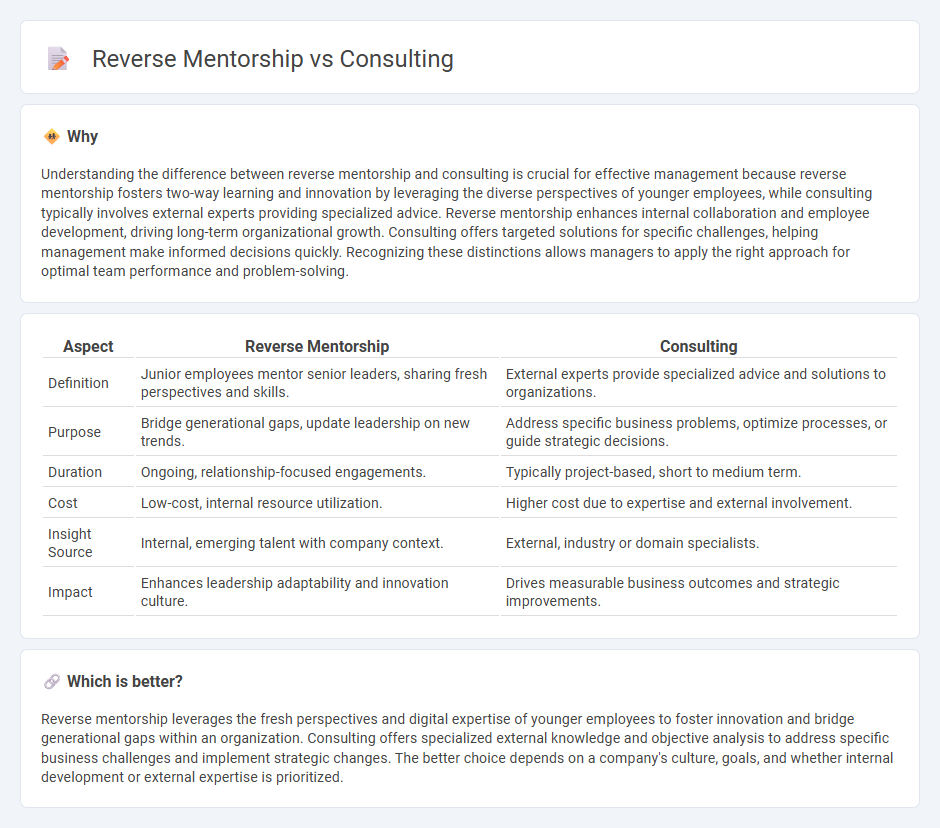
Reverse mentorship leverages the insights of younger employees to guide senior leaders, fostering innovation and bridging generational gaps, while consulting offers expert advice from external specialists to address specific business challenges. Both approaches enhance organizational growth but differ in perspective and execution--reverse mentorship focuses on internal knowledge exchange, whereas consulting emphasizes external expertise. Explore how integrating these strategies can drive effective management solutions.
Why it is important
Understanding the difference between reverse mentorship and consulting is crucial for effective management because reverse mentorship fosters two-way learning and innovation by leveraging the diverse perspectives of younger employees, while consulting typically involves external experts providing specialized advice. Reverse mentorship enhances internal collaboration and employee development, driving long-term organizational growth. Consulting offers targeted solutions for specific challenges, helping management make informed decisions quickly. Recognizing these distinctions allows managers to apply the right approach for optimal team performance and problem-solving.
Comparison Table
| Aspect | Reverse Mentorship | Consulting |
|---|---|---|
| Definition | Junior employees mentor senior leaders, sharing fresh perspectives and skills. | External experts provide specialized advice and solutions to organizations. |
| Purpose | Bridge generational gaps, update leadership on new trends. | Address specific business problems, optimize processes, or guide strategic decisions. |
| Duration | Ongoing, relationship-focused engagements. | Typically project-based, short to medium term. |
| Cost | Low-cost, internal resource utilization. | Higher cost due to expertise and external involvement. |
| Insight Source | Internal, emerging talent with company context. | External, industry or domain specialists. |
| Impact | Enhances leadership adaptability and innovation culture. | Drives measurable business outcomes and strategic improvements. |
Which is better?
Reverse mentorship leverages the fresh perspectives and digital expertise of younger employees to foster innovation and bridge generational gaps within an organization. Consulting offers specialized external knowledge and objective analysis to address specific business challenges and implement strategic changes. The better choice depends on a company's culture, goals, and whether internal development or external expertise is prioritized.
Connection
Reverse mentorship enhances consulting by fostering bidirectional knowledge exchange, where junior employees share fresh insights and digital expertise with senior consultants. This dynamic improves decision-making processes and drives innovative strategies in management consulting firms. Integrating reverse mentorship within consulting structures accelerates organizational learning and adaptation in competitive markets.
Key Terms
Consulting:
Consulting involves providing expert advice and strategic solutions to improve business performance, leveraging industry knowledge and analytical skills to address client challenges. It focuses on delivering actionable insights through detailed research, data analysis, and tailored recommendations that drive organizational growth and efficiency. Explore more about how consulting transforms businesses with innovative problem-solving strategies.
Expertise
Consulting leverages external experts to provide specialized knowledge and strategic advice, often focusing on industry-specific expertise and problem-solving capabilities. Reverse mentorship emphasizes mutual learning by pairing junior employees with senior leaders, enhancing skills like digital literacy and cultural awareness through firsthand experience. Explore more insights on how these approaches maximize organizational expertise and innovation.
Problem-solving
Consulting leverages expert knowledge to provide strategic solutions, addressing complex business challenges through specialized insights. Reverse mentorship fosters a dynamic exchange of ideas, empowering younger employees to offer fresh perspectives that enhance problem-solving agility. Explore how integrating both approaches can transform your organization's approach to innovation and decision-making.
Source and External Links
Wikipedia: Consulting Firm - A consulting firm offers professional services, providing expertise and specialized labor for a fee, operating as part of the knowledge economy.
Harvard Business Review: Consulting Is More Than Giving Advice - This article discusses the broader role of consultants beyond mere advice, emphasizing the need for clients and consultants to align expectations.
Boston Consulting Group - BCG is a global consulting firm that partners with leaders in business and society to tackle significant challenges through strategic management consulting.
 dowidth.com
dowidth.com